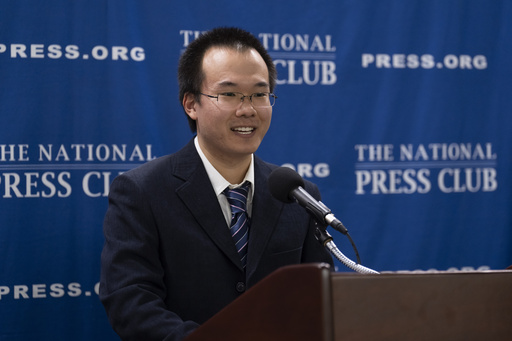In a recent development, the son of a prominent Chinese journalist who has been accused of espionage has made an impassioned plea for his father’s release. The journalist, Dong Yuyu, received a seven-year prison sentence in a high-profile case that has been widely viewed as indicative of Beijing’s increasingly stringent hold over journalism.
Dong Yuyu, who served as a senior editor at a newspaper run by the Communist Party, found himself at odds with the party’s increasingly rigid policies. His arrest took place in February 2022 while he was dining with a Japanese diplomat in Beijing.
During a press briefing at the National Press Club in Washington, Dong Yuyu’s son, Dong Yifu, expressed his father’s intention to appeal the conviction. He urged Japanese authorities to assist in demonstrating that the interactions between his father and Japanese diplomats were unrelated to espionage activities.
“This is a matter of press freedom. It’s a human rights issue that isn’t significantly connected to national security or espionage,” Dong Yifu remarked.
The Chinese Foreign Ministry has not yet provided a comment on the matter.
Previously, Dong Yuyu held the position of deputy head of the commentary department at Guangming Daily, a publication once known for its comparatively liberal stance. He authored articles advocating for constitutional democracy, political reform, and accountability among officials—topics that were once openly discussed in party publications but have since fallen out of favor.
Dong Yuyu’s career included a fellowship at Harvard University from 2006 to 2007, as well as a visiting fellowship at Keio University in Japan in 2010. He later served as a visiting professor at Hokkaido University in Japan before returning to China.
His arrest, occurring just two months before his intended retirement from Guangming Daily, sent shockwaves through the journalistic and diplomatic communities in China. Journalists commonly engage with diplomats as part of their information-gathering processes.
Dong Yifu revealed that in court, it was mentioned that his father had eight meetings with Japanese diplomats, which were presented as evidence against him.
Last November, Beijing No. 2 Intermediate People’s Court handed down a seven-year prison sentence to Dong Yuyu for espionage. At the time, U.S. Ambassador Nicholas Burns described the ruling as unjust.
Despite his incarceration, Dong Yuyu remains in good health and tries to maintain fitness by performing 200 pushups and 200 leg raises daily. However, he is limited to just a few hours of sunlight each year and has not been permitted to see his wife.
Dong’s attorney is allowed monthly visits and can deliver handwritten letters from his wife. Dong Yifu shared that his father has prepared a 45-page handwritten document for the appeal.
Recently, the U.S. State Department advocated for Dong’s immediate and unconditional release in a public statement.
The Paris-based organization Reporters Without Borders also condemned the state of press freedom in China, labeling the country as “the world’s largest prison for journalists,” with over 100 currently detained. The group criticized Beijing for frequently leveraging espionage charges to suppress journalists, as well as other broad accusations such as subversion and “picking quarrels and provoking trouble.”


